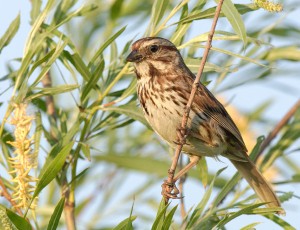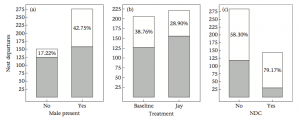Until recently, research on songbird calls has been biased towards the study of male calling, with female calls receiving relatively little attention. In many species this is because male songbirds are more vocal than females, but many females produce their own songs as well. In particular, females of the species Melospiza melodia (the common song sparrow) emit vocalizations known as nest departure calls when leaving their nests.

Melospiza melodia, the common song sparrow.
Image source: http://upload.wikimedia.org/wikipedia/commons/a/a4/Melospiza-melodia-001.jpg.
When females are incubating their eggs, they must occasionally leave the nest to forage for food, leaving their nest highly vulnerable to predators. It seems that it would be in the female’s best interest to be as quiet as possible, to avoid drawing the attention of predators to the unguarded nest. So why do female song sparrow frequently sing while leaving the nest? Researchers believe that it could be a way of recruiting male mates to guard the nest in the absence of the females, but until now there has been little experimental evidence to support this hypothesis. However, the obvious tradeoff of producing such a call is that it could potentially attract predators. Thus, song sparrows must decide whether or not to produce a call depending on the circumstances.
In order to evaluate what factors contribute to making this choice, the researchers Grunst, Grunst, and Rotenberry (2014) set up video cameras to record the nest departure calling behavior of female song sparrows between the second and eighth day of egg incubation. They observed how the calling behavior changed depending on the presence or absence of the male mate, as well as whether the calling frequency differed depending on the size of the male. They also tested how the song sparrows would respond to the presence of a decoy scrub jay (a common predator of the song sparrow) paired with a recording of its call, to evaluate how calling behavior is changed when a predator is nearby.
The results demonstrated that females produced nest departures calls significantly more frequently in the presence of the male mate, and that males were more likely to guard the nest if females produced the call upon leaving, supporting the hypothesis that nest departure calling is used to recruit males to guard the nest. Call frequency also increased when larger males were present, indicating that the benefit of calling is greater when the male is more capable of defending the nest. In addition, females produced fewer nest departure calls in the presence of the scrub jay decoy, supporting the theory that females are aware of the risk of calling when a predator could use the call to locate the nest.

The results indicated that females called more frequently when the males were present (a), and males were significantly more likely to guard the nest when the females produced a nest departure call (c). In addition, the females called less frequently in the presence of the scrub jay decoy (b). Key: White bars = (a and b) females produced nest departure call, or (c) males guarded nest; Gray bars = (a and b) females did not produce nest departure call, or (c) males did not guard nest. NDC = nest departure call. Percentages indicate the proportion of the white bars to the total. Image source: Grunst et al., 2014.
Thus, female song sparrows face a cost-benefit scenario, in which calling could either protect the nest or make the nest more vulnerable, depending on the circumstances. Future research should focus on determining how song sparrows respond when both males and predators are present, and which factors contribute more significantly to the decision-making process. In addition, as song sparrows often inhabit urban environments now, it would be very interesting to investigate how noise pollution can interfere with this delicate signaling process. This could be a very important direction in which to take the research, because it is crucial to understand how urbanization affects the behavior of native species. It is possible that living in urban environments could significantly impair the ability of song sparrows to evaluate when it is best to use the nest departure call, and it is essential that we investigate this so as to determine how to minimize our impact on the survivability of native species like the song sparrow.
Sources:
Grunst, M. L., Grunst, A. S., & Rotenberry, J. T. (2014). Phenotypic plasticity in nest departure calls: Weighing costs and benefits. Animal Behaviour, 90, 31-39.

what kind of benefit that contained in sparow?